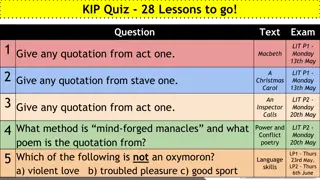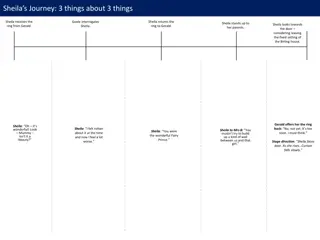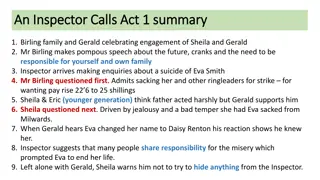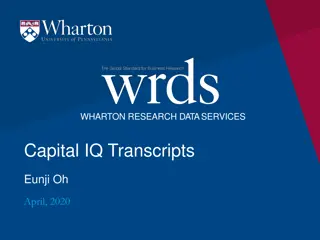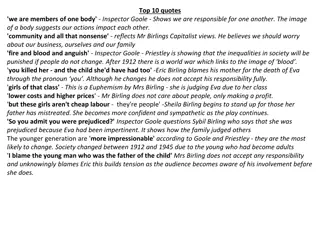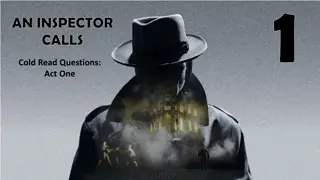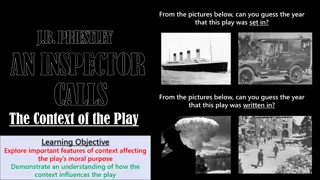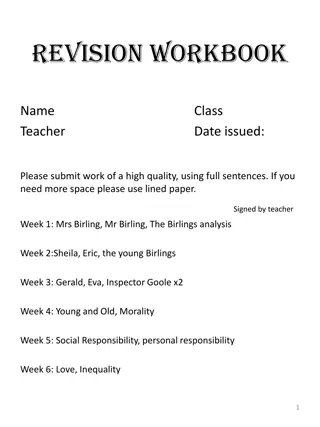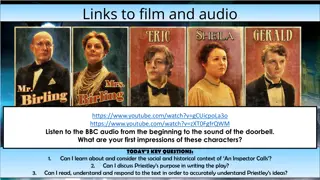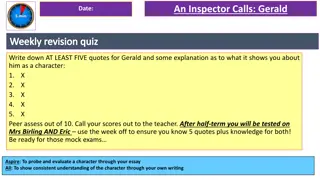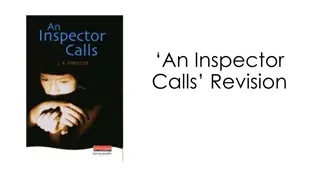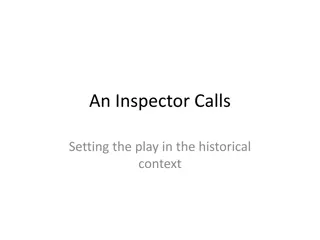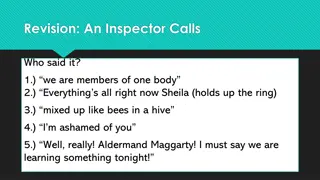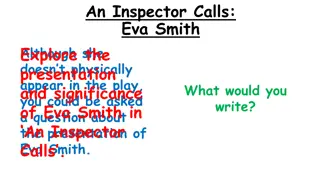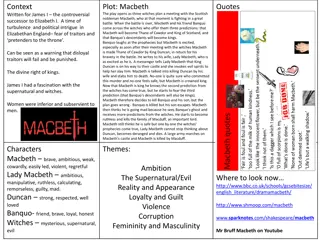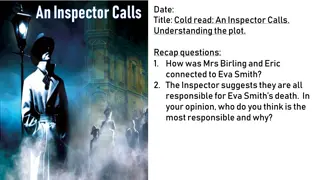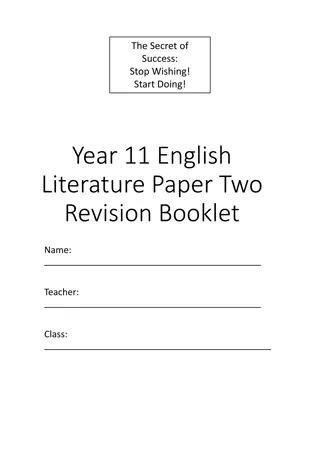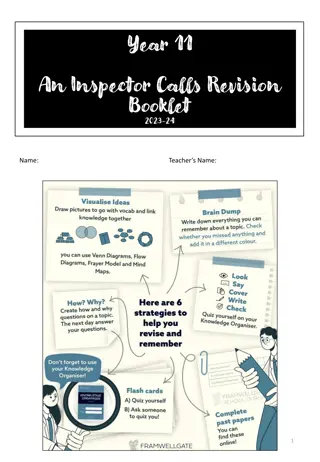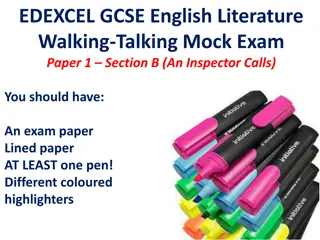Insights Into 'An Inspector Calls' Characters
In "An Inspector Calls," the Inspector represents socialism, with an air of solidity and omniscience. He delivers a warning about mankind needing to change and accept responsibility. Mr. Birling, on the other hand, embodies capitalism, shown as unlikeable and out of touch. The play critiques Birling's self-centeredness and highlights the clash between socialism and capitalism.
Download Presentation

Please find below an Image/Link to download the presentation.
The content on the website is provided AS IS for your information and personal use only. It may not be sold, licensed, or shared on other websites without obtaining consent from the author. Download presentation by click this link. If you encounter any issues during the download, it is possible that the publisher has removed the file from their server.
E N D
Presentation Transcript
AQA: English Literature (Paper 2): An Inspector Calls The Inspector Success Criteria Read Reduce Using the mark scheme, highlight where the assessment objectives have been met in the model paragraph. Read the information on the Inspector. In no more than 50 words, summarise how The Inspector is presented in the play as a whole: Although the Inspector is Priestley s mouthpiece and his role is to spread the message of socialism, his identity remains unclear. He immediately creates an impression of solidity when he enters the room and the lighting becomes brighter and harder , perhaps symbolising the power of socialism and the interrogation the Birlings are about to endure. Priestley may have used the noun solidity to give the impression that the Inspector, and therefore socialism, cannot be defeated or destroyed, unlike capitalism, an ideology the Inspector manages to pull apart with relative ease over the course of the evening. AO1 Read, understand and respond to texts. Use quotations and discuss them. AO2 Analyse the text using subject terminology. AO3 Include social and historical context. The audience learns little about the Inspector over the course of the play. It could be argued that his identity is of little importance as this would devalue the message he seeks to deliver to the Birlings. He is stoical and philosophical and ensures his presence is felt through the younger generation once he leaves. At the end of the play, he warns that if people like the Birlings do not change their ways, the consequences will be catastrophic. For example, he says that if men do not learn the lessons of responsibility, then they will be taught it in fire and blood and anguish , a clear reference to the two world wars a contemporary audience had just experienced. The Inspector could be described as omniscient, an all knowing character championing the lower classes who do not have a voice. The nouns, fire and blood connote pain and suffering. The Inspector delivers a stark warning; mankind needs to change and accept responsibility for others. The Inspector s views are unshakeable. Criticise The Inspector fails in his task as the hubristic nature of man is not fully destroyed at the end of the play To what extent do you agree with the above statement? Use your knowledge of the entire text to help you answer. Transform Using the play, draw three images which represent the Inspector and his actions across the evening. Label with appropriate evidence. Magpie Select at least 3 key words from the response that you could use when writing about the Inspector. Make sure you define them. KEY WORD DEFINITION
AQA: English Literature (Paper 2): An Inspector Calls Mr. Birling Success Criteria Read Reduce Using the mark scheme, highlight where the assessment objectives have been met in the model paragraph. Read the information on Mr Birling. In no more than 50 words, summarise how Mr. Birling is presented in the play as a whole: By making Birling seem unlikeable, Priestley is encouraging the audience to see the benefits of socialism. The audience, Priestley hopes, will associate Birling with capitalist ideology and reject capitalism as a way of life when they see how the character strengthens wealth and class divide with his beliefs. Priestley uses dramatic irony at the beginning of the play to help present Birling as a man who does not know what he is talking about. For example, Birling, who sees himself as a hard headed, practical man of business believes the Titanic is unsinkable , that the Germans don t want war and that the country is heading towards a time of steadily increasing prosperity . An audience watching in 1946 would know this to be wrong; at this time they would still be feeling the effects of two world wars and so would scoff at Birling s opinions that he states as fact. In fact, Birling continues to do this throughout the beginning of the play until his capitalist beliefs are cut off by the doorbell, rung by the Inspector and signifying the arrival of socialism. Birling s household is a clear microcosm for a capitalist society. Mr Birling plays the role of Priestley s puppet in An Inspector Calls . AO1 Read, understand and respond to texts. Use quotations and discuss them. AO2 Analyse the text using subject terminology. AO3 Include social and historical context. Criticise Mr. Birling is only concerned with self- preservation. To what extent do you agree with the above statement? Use your knowledge of the entire text to help you answer. Transform Using the play, draw three images which represent Mr Birling s journey across the evening. Label with appropriate evidence. Magpie Select at least 3 key words from the response that you could use when writing about Mr Birling. Make sure you define them. KEY WORD DEFINITION
AQA: English Literature (Paper 2): An Inspector Calls - Eric Success Criteria Read Reduce Using the mark scheme, highlight where the assessment objectives have been met in the model paragraph. Read the information on Eric. In no more than 50 words, summarise how Eric is presented in the play as a whole: The character of Eric is first presented as being very immature as at the start of Act One, he guffaws at Sheila. Here, he is sitting at the dinner table and his sister is discussing her coming marriage, but the verb suggests he making fun of her and not really taking the situation seriously. A young man, in his position, would be accustomed to spending time drinking and socialising in upper class social circles because of the fortunate position he was born into. Perhaps Priestley allows Eric and Sheila to continue to have a childlike conversation because he wans to highlight their immaturity. Priestley intends to present Eric as mischievous and spoilt; he does not have a sense of responsibility considering he is a young man and actually behaves more like a child here. The goldenage Eric is enjoying is soon to come to an end within the play but also because the audience know that World War One began in 1914; it was considered to be a social leveller because men, like Eric, were conscripted. It is significant that Eric is laughing at the start of the play, with regards to structure, as unfortunately, for Eric, this is the last evening of his rose-tinted youth he certainly isn t laughing at the end of the play this reflects the journey of responsibility and maturity that he has undertaken. AO1 Read, understand and respond to texts. Use quotations and discuss them. AO2 Analyse the text using subject terminology. AO3 Include social and historical context. Criticise Eric s actions in the play are a result of his social upbringing. To what extent do you agree with the above statement? Use your knowledge of the entire text to help you answer. Transform Using the play, draw three images which represent Eric s journey across the evening. Label with appropriate evidence. Magpie Select at least 3 key words from the response that you could use when writing about Eric. Make sure you define them. KEY WORD DEFINITION
AQA: English Literature (Paper 2): An Inspector Calls Sheila Success Criteria Read Reduce Using the mark scheme, highlight where the assessment objectives have been met in the model paragraph. Read the information on Sheila. In no more than 50 words, summarise how Sheila is presented in the play as a whole: audience are first introduced to her, she is described as being pleased with life and rather excited . The adjective excited may suggest that Sheila is quite silly and pampered; she is ignorant to the harsh realities of society which contributes to her selfish actions later in the play when she discusses how she had Eva sacked from her job. Mrs Birling, Sheila s mother, clearly expects her to conform to the traditional role of a woman in early 1900s society. Upper class women would have few choices; the best they could hope for was to impress a rich man and marry well. As Sheila changes, however, this becomes less likely. One event that demonstrates just how far Sheila has come in the play is her return of her engagement ring. When Gerald first presents Sheila with it, she says, I ll never let it go out of my sight for an instant , yet later in the play, she hands it back of her own free will. She accepts responsibility for the role she played in Eva Smith s death and her epiphany gives her the strength to reject the capitalist ways of life that her parents and Gerald represent. The Inspector s presence is felt through Sheila even when he leaves. Sheila is a member of the younger generation, a group who are Priestley s hope for a better future. By the end of the play she has turned against her parents. She says they frighten her. The verb frightens shows audiences how alarmed Sheila has become that her parents have learnt nothing from their ordeal with the Inspector. Sheila has been used by Priestley to create internal conflict and division within the Birling family. She is no longer the protected girl she was at the beginning of the play, yet this exposes her to mockery from her own family who say she is now part of the famous younger generation who know it all. Sheila is the character who changes the most throughout the play. When the AO1 Read, understand and respond to texts. Use quotations and discuss them. AO2 Analyse the text using subject terminology. AO3 Include social and historical context. Criticise Sheila is responsible for the division of the Birlings, not the Inspector To what extent do you agree with the above statement? Use your knowledge of the entire text to help you answer. Transform Using the play, draw three images which represent Sheila and her actions across the evening. Label with appropriate evidence. Magpie Select at least 3 key words from the response that you could use when writing about Sheila. Make sure you define them. KEY WORD DEFINITION
AQA: English Literature (Paper 2): An Inspector Calls Mrs Birling Success Criteria Reduce Read Using the mark scheme, highlight where the assessment objectives have been met in the model paragraph. In no more than 50 words, summarise how Mrs Birling is presented in the play as a whole: Read the information on Mrs Birling. Mrs Birling is initially described as a cold woman by Priestley. The adjective cold tells audiences that Mrs Birling is unapproachable and unsympathetic. Priestley intends to make her unlikeable so that those watching the play side with the younger generation, a group that Priestley places his hopes in for the future. Mrs Birling is oldmoney ; she has inherited her wealth and has always lived a life of luxury. Perhaps this is what fuels her sense of entitlement and the power she believes she holds over others. AO1 Read, understand and respond to texts. Use quotations and discuss them. AO2 Analyse the text using subject terminology. AO3 Include social and historical context. Mrs Birling links to the theme of appearance vs reality . She presents herself to the world as being a caring citizen, using her position in society to do good for women in need. The opposite, however, is true. Mrs Birling is there for her own gain and she changes little throughout the play, telling the Inspector that she has done her duty . Perhaps her unshakeable views are the thing that lead Mrs Birling to unwittingly condemn her own son to punishment before she realises he is the father of Eva Smith s child. So determined is she to shun all responsibility that she says, he ought to be dealt with very severely. Criticise Mrs Birling s actions are worse than any of the actions of her family To what extent do you agree with the above statement? Use your knowledge of the entire text to help you answer. By the end of the play, Mrs Birling s sense of superiority has returned and she has learnt little from her dealings with the Inspector over the course of the evening. She says of Eric and Sheila that in the morning they ll be as amused as we are. The verb amused has been used to tell us that she not taken the Inspector s message seriously. She continues to lack empathy and returns to her ignorant, judgemental and seemingly pious ways. Of course, it is this decision which means the Birlings must endure another interrogation at the end of the play, as signalled by the ringing of the telephone. Transform Using the play, draw three images which represent Mrs Birling and her actions across the evening. Label with appropriate evidence. Magpie Select at least 3 key words from the response that you could use when writing about Mrs Birling. Make sure you define them. KEY WORD DEFINITION
AQA: English Literature (Paper 2): An Inspector Calls Eva Smith Reduce Success Criteria Read Using the mark scheme, highlight where the assessment objectives have been met in the model paragraph. In no more than 50 words, summarise how Eva Smith is presented in the play as a whole: Read the information on Eva Smith. moral but vulnerable and symbolic of the poor, working class who suffered hardship under those like the Birlings. The existence of Eva is brought to the attention of the audience by the Inspector, who arrives at the Birlings home to interrogate them about their involvement in her death. The Inspector describes her using the adjective pretty , suggesting youth, vitality and exuberance. Immediately, the audience feel a sense of sympathy for Eva and in turn, disgust at the behaviour of the Birlings and their actions that have destroyed the life of this young girl. Once they shun her, Eva has no where to turn. There was no support for the lower classes at this time and employers could essentially dictate how their workers lived based on how much they paid them. Perhaps Eva has the surname Smith because it is common. Therefore, Priestley s message relates to more people. In fact, in his final speech, the Inspector says there are millions and millions and millions of Eva Smiths and John Smiths still left with us. Although she does not physically appear in the play, Priestley gives the lower class a presence through Eva. Priestley humanises the lower class for his audiences, saying they have hopes and fears suffering and [chances] of happiness. In this respect, the importance of Eva cannot be downplayed. She is the driving force behind the play and her character is keenly felt throughout the events of the evening. Eva is forced to adopt different personas in order to survive. When she meets Gerald, for instance, she calls herself Daisy Renton. Her choice of name here is both interesting and significant. Daisy is a flower, suggesting innocence and naivety. However, flowers can easily be crushed and when she is turned away by Mrs Birling, Eva has no one to turn to and she becomes another victim of a cruel society that is unwilling to help her. Eva Smith is clearly presented as a victim of social injustice throughout the play. She is AO1 Read, understand and respond to texts. Use quotations and discuss them. AO2 Analyse the text using subject terminology. AO3 Include social and historical context. Criticise Eva is not the weakest character in the play To what extent do you agree with the above statement? Use your knowledge of the entire text to help you answer. Transform Using the play, draw three images which represent Eva Smith and her actions. Label with appropriate evidence. Magpie Select at least 3 key words from the response that you could use when writing about Eva Smith. Make sure you define them. KEY WORD DEFINITION
AQA: English Literature (Paper 2): An Inspector Calls Gerald Success Criteria Read Using the mark scheme, highlight where the assessment objectives have been met in the model paragraph. Reduce Read the information on Gerald. In no more than 50 words, summarise how Gerald is presented in the play as a whole: standing, a young capitalist and favoured by Birling who supports the engagement because he is more interested by potential business ventures than his daughter s happiness. Although Gerald shows that he is intolerant of the lower classes throughout the play, it could be argued that his heart is in the right place. It seems he genuinely did have feelings for Eva Smith (or Daisy Renton as he knew her) as he is very moved by her death. He says, I was sorry for her when he discusses how he knew her. Gerald s observation is interesting as it shows how feelings and emotions towards others can break down the class boundaries imposed by society. Although Gerald appears remorseful for his actions towards Daisy Renton, he is one of the first characters to revert back to his original beliefs. His attempt to give Sheila back the ring at the end of the play suggests he wants things to go back to the way they were. He says, Everything s all right now, Sheila , indicating to the audience that he has learnt very little from his dealings with the Inspector. Gerald is a character who bridges the generations. He is of high social AO1 Read, understand and respond to texts. Use quotations and discuss them. AO2 Analyse the text using subject terminology. AO3 Include social and historical context. Criticise Gerald is emotionally manipulative and what he does to Eva is worse than the others. To what extent do you agree with the above statement? Use your knowledge of the entire text to help you answer. Transform Using the play, draw three images which represent Gerald s journey across the evening. Label with appropriate evidence. Magpie Select at least 3 key words from the response that you could use when writing about Gerald. Make sure you define them. KEY WORD DEFINITION




